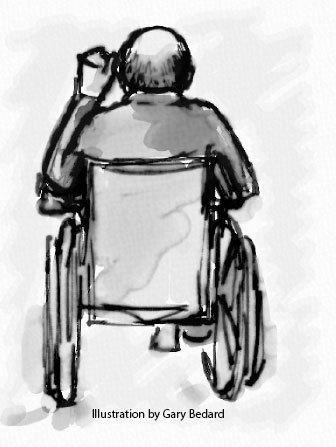As The Nation’s Population Ages, Our Caretakers Will Need Support
By Bill Carey of Ferndale
NATIONWIDE, THERE ARE MILLIONS OF PEOPLE taking care of the nearly 5.3 million individuals currently living with Alzheimer’s disease or dementia. By the year 2030, that number will soar as 71 million individuals will reach age 65 and older. Despite those staggering statistics, Alzheimer’s and dementia caretakers often feel isolated in their struggles.
I am one of those individuals living with dementia. My partner, who I am grateful for everyday, has the stressful job of being my caretaker. While we both noticed the signs around the same time that my memory  was failing, and I no longer am able to work, I am fortunate to remain fairly active right now because I reside in a walk-able town. Living in Ferndale, in a tight-knit community where people help one another and the streets are easy to navigate has been good for me thus far. In time, my memory will fail more and life will get harder; it’s my partner whom I most concerned about.
was failing, and I no longer am able to work, I am fortunate to remain fairly active right now because I reside in a walk-able town. Living in Ferndale, in a tight-knit community where people help one another and the streets are easy to navigate has been good for me thus far. In time, my memory will fail more and life will get harder; it’s my partner whom I most concerned about.
Despite our awareness of dementia and Alzheimer’s disease, no one can ever be fully prepared to watch a parent or loved one fade away – or experience losing their own memories. No one can understand the fear, fatigue, alienation and stress this brings until they are in it.
In Michigan, more than 180,000 individuals like myself are living with Alzheimer’s disease or dementia.
Families around the state who are taking care of their loved ones are dealing with insurmountable stress everyday. The saving grace for many is nonprofit organizations such as the Alzheimer’s Association of Michigan,whose mission is to eliminate Alzheimer’s disease through the advancement of research; provide and enhance care and support for all affected and reduce the risk of dementia through the promotion of brain health. Their resources and support groups help those living with dementia and Alzheimer’s disease, and their caretakers, develop relationships with others who understand their situation as they go through the same day-to-day struggles. It also is where many find the encouragement to stay strong and obtain the resources to get much needed help.
Being able to call the Association for information about respite care, emotional support and advocacy is crucial and will continue to be for many as loved ones age. The support groups have been very helpful for me.
This year, for the third consec-utive year, the Association wass listed on the Michigan Voluntary Contribution Schedule. This annual tax form provides tax-payers with the option to contribute all or part of their tax return directly to the organiz-ation in order help Michigan families who have no place else to turn.
If you know a caretaker, or someone living with dementia or Alzheimer’s, please reach out to them and offer your listening ear. Offer to sit with a caretaker’s loved one so they can have those crucial few minutes alone to run an errand or even take a shower. Bring them a meal. Also, if they aren’t using the services of the Alzheimer’s Association of Michigan already, providing them with the organization’s phone number or www.alz.org/gmc may be the single best thing you can do for them.
For more information visit www.alz.org/gmc
If slightly happened with our soundness, we believe there is a solution to any maladies in a medicament. What medicines do patients purchase online? Viagra which is used to treat impotence and other states connected to erectile dysfunction. Learn more about “sildenafil“. What people talk about “viagra stories“? The most substantial aspect you must look for is “sildenafil citrate“. Such problems commonly signal other problems: low libido or erectile malfunction can be the symptom a strong heartiness problem such as heart trouble. Causes of sexual dysfunction turn on injury to the penis. Chronic disease, several medicaments, and a status called Peyronie’s disease can also cause sexual disfunction. Even though this physic is not for use in women, it is not known whether this therapy passes into breast milk.



